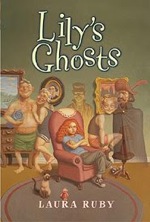
Award-winning author Laura Ruby talks about the reissue of her out-of-print book, Lilly’s Ghosts, as an ebook. This required some editing and made her nervous. From the posting at E is for Book:
So, it was nerve-wracking to open the Word file of my OP middle-grade novel LILY’S GHOSTS in preparation for re-release as an ebook. I was tempted to put back my original ending and restore this or that scene. But, as I cleaned up the file, making various small edits here and there, I was happy to find that I didn’t want to revise, oh, everything. And I liked the ending. (My editor was very good at her job.) …
I’ve got a few worries about ebooks. One of them is that ebooks are necessarily more ephemeral and transitory than print books, especially when you take into account the fact that changing technology could render the ebooks you purchase today unreadable in a few years. I worry that editing files from one version of the book to the next contributes to the sense that stories are short-lived and fleeting, and because of this, not as valuable. And yet, I can’t help but want to improve a story if I have the opportunity to do it.
I guess the questions here are a) am I censoring myself? and b) should I edit a book that has already been in print? The answer to that first question is no, I don’t think I’m censoring myself. The things that might make the book a difficult choice for some — the ghosts, the light romance, mentions of the occult, the cheerfully creepy tone, etc. — all remain, as they are all central to the story. The manner of this particular ghost character’s death? Not so much.
The answer to that second question, however, is fuzzy to me. Is it a bad idea to re-edit OP books? Have I already made my choices? What do you think?
































Editing books that have already been in print is nothing new – Tolkien did it, Stephen King did it, Diane Duane is doing it… And it’s not unique to books; video games have been doing it for a while, as have movies with their “director’s cuts” on DVD.
I think it’s hardly uncommon, and probably even a good thing. 🙂
I see no problem with reediting an out-of-print — or even a currently in print — book, whether print or electronic format AS LONG AS it is clearly indicated that it is revised. In fact, the beauty of ebooks is that it will allow for reediting.
A year ago, I suggested reediting and rewriting as a good strategy for university presses in my article “Can eBooks Save Unibversity Presses?” (http://americaneditor.wordpress.com/2010/04/08/can-ebooks-save-university-presses/). Also a year ago, I discussed the problems of the never-ending rewrite for nonfiction books in my article “eBooks and the Never-Ending Rewrite” (http://americaneditor.wordpress.com/2010/03/02/ebooks-and-the-never-ending-rewrite/).
I think versioning of ebooks will soon be both accepted and commonplace and that it will be the unversioned ebook that will be the exception rather than the rule. The real question will be that of copyright: Will reediting (or versioning) add to the copyright morass?
Marion Zimmer Bradley reportedly started to edit one of her early Darkover books (Sword of Aldones) and ended up completely rewriting it, ending up with what is arguably the best single book in the series.
This doesn’t mean the story is ephemeral, merely that the writer has grown and matured.
While discussing his writing style, Asimov once said that “books are never finished, merely abandoned”.
Thanks for linking to Laura’s article, e is for book has also linked back here. Good comments are going on in both places. I noticed the term “author’s cut” in the TeleRead article about Diane Duane… people are liking that term. : )
I see this as a great opportunity for writers. Though Zimmer’s experience with the Darkover novel should serve as warning: once you go back, you might end up spending considerable time on an old book.
On the other hand, see what movie studios do with DVD and BluRay releases: alternate endings, deleted scenes, and lots of other ‘extras.’ These typically show up on premium versions of the disks, and cheap econo-versions, sometimes released later, have the theatrical release and nothing else.
So Ruby could well have included the ‘original ending’ as an additional chapter to the ebook version, advertising it as such, and made some extra sales to fans who bought the pbook, loved it, and still have their copy. I’m sure there are some of them very interested in this sort of thing. And any scholars of her work would be interested in such literary archaeology.
I can see a day coming when ebook versions might be stuffed full of past drafts of the work in question. Along with notes from the author, a la ‘director’s commentary’ to add value to the ebook that does not appear in the printed version.
I am sure there must be many ‘early efforts’, by what later turned out to be excellent but as yet under developed writers, that could be turned into great pieces if revisited and/or rewritten.
Ooooh, scary technology! me small writer, me want to pres butan and have it go.
“One of them is that ebooks are necessarily more ephemeral and transitory than print books, especially when you take into account the fact that changing technology could render the ebooks you purchase today unreadable in a few years.”
Yes, just like happened with vinyl records. I mean, you remember how, when CDs came out, they burned everyone’s turntables so we all had to buy those albums again. Oh wait, that’s not what happened at all.